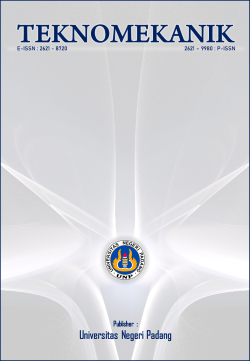Concept of curriculum evaluation in Education Program of Electrical Engineering using AUN-QA as benchmarking
DOI:
https://doi.org/10.24036/jptk.v3i1.3123Keywords:
Curriculum Evaluation, Quality Graduates, Criteria AUN-QAAbstract
Qualified graduates is supported by an efficient process of education, improvement of competence on an ongoing basis, and appropriate curriculum. The curriculum becomes an important part in education. Each educational institution graduates expect superior quality, good morals, knowledge and competence of skilled labor. Quality of qualified graduates will increase the demand of stakeholders to recruit workers in the industry related. It is necessary to implement a quality program in an effort to provide the best service for educational activities. This study discusses the program carried out by educational and vocational study program in electrical engineering (EEVE) achieve the goal to do assessment by AUN-QA (ASEAN University Network-Quality Assurance) in evaluating the curriculum. AUN-QA aims to conduct quality assurance of courses that a member of AUN, as well as guiding and guide the university to improve and maintain the quality of the university. Researchers use qualitative research using the comparative method of ex-postfacto with the kind of correlational study. The study was conducted with data collection, such as observation, interviews, field observation and documentation study. This research resulted in the development of curriculum in vocational and educational courses in electrical engineering (EEVE), in terms of meeting the basic needs for qualified graduates, competent and professional in accordance with the standards of the AUN-QA. Through this research is expected to be a pattern for other courses to evaluate the curriculum for graduates scored an excellent, competent and qualified
Downloads
References
Presiden Republik Indonesia. Kerangka Kualifikasi Nasional Indonesia. Peraturan Presiden Republik Indonesia Nomor 8 Tahun 2012. Jakarta, Jakarta, Indonesia: Menteri Hukum dan Hak Asasi Manusia Republik Indonesia. 2012.
Wulandari Tutik, Studi Analisis Kebutuhan Stakeholder Terhadap Lulusan Program Studi Pendidikan Teknik Elektro Universitas Negeri Padang, Skripsi, Padang, Universitas Negeri Padang.Agus Suprijono. Cooperative Learning: teori dan praktik. Yogyakarta: Pustaka Pelajar, 2018.
Accreditation Commission for Senior Colleges and Universities. Handbook of Accreditation. Alameda, CA: Western Association of Schools and Colleges. 2001.
Mulyono Amidi, Menyongsong Asesmen AUN-QA, Journal, pp.1-8. 2018.
BAN-PT. Guide to AUN-QA Asessessment at Programme Level. Version 3.0. Bangkok: Chulalangkom University. 2016.
Mukhaiyar R., Muskhir M., Hambali., and Vice PD., Curriculum Evaluation based on AUN-QA Criterion for the Case Study of the Electrical Engineering Vocational and Educational (EEVE) Study Program. International Journal, pp.1-4. 2019.
Meldia Syafrina Putri, Pemetaan Kurikulum Program Studi Pendidikan Teknik Elektro Fakultas Teknik Universitas Negeri Padang Untuk Memaksimalkan Kompetensi Lulusan, Skripsi, Padang, Universitas Negeri Padang. 2018.
Ayu Ardillah Anwar. Analisis Perspektif Stakeholder Terhadap Implementasi Corporate Social Responsibility (CSR). Skripsi. Makasar: Universitas Hasanudin. 2013.
Hamid Darmadi, Metode Penelitian Pendidikan. (Bandung; Alfabeta, h. 223. 2011.
Curtis RF and Crunkilton Curriculum Development in Vocational and Technical education: Planning, Content, and Implementation (Allyn and Bacon Inc) Muhammad Nur. Pengajaran Langsung. Surayabaya: Pusat Sains dan Matematika sekolah UNESA, 2011.
Downloads
Published
Issue
Section
License
Copyright (c) 2020 Vice Pramutia Dolly, Riki Mukhaiyar

This work is licensed under a Creative Commons Attribution 4.0 International License.





